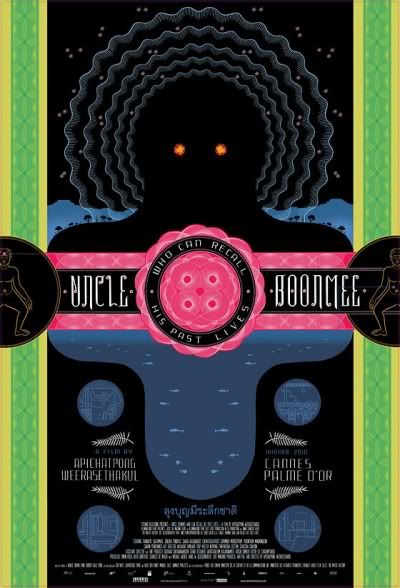
[Uncle Boonmee Who Can Recall His Past Lives, the latest from Apichatpong Weerasethakul, is a personal, gentle and playful contemplation of reincarnation and transmigration of souls. I got a chance to sit down for an interview (via skype) with the acclaimed Thai director about the film, art, censorship and Thai independent cinema. Despite some technical hiccups prior to our interview, his generosity and thoughtful responses impressed me a great deal.]
So Where are you right now?
I'm in Mexico City, at the museum where I'm doing installations for Primitive that opens this Saturday.
Uncle Boonmee is part of Primitive, a multi-platform art project that you've been working on for a while. Can you tell me how it came about?
It was right after Syndromes and a Century I began thinking about it. It's a survey of the northeastern Thailand where I grew up. After Syndrome, I wanted to go back to my roots, where I came from. So I started to travel around doing small art projects and I didn't even know what the final project would be like. But the traveling process through the region was very important to me. It gradually snowballed to what it is now.
I saw A Letter to Uncle Boonmee and Phantom of Nabua from Primitive. So they are all shot in places where you grew up?
Not exactly the same town, but in the same northeastern region near Thai-Lao border. Once a communist rebels' stronghold, the region holds important Thai history in my mind.
Is this an ongoing project that will go beyond Uncle Boonmee?
There is another project I'm planning to do in the same region but I need to differentiate the two. Primitive was about remembering the history of the region. The new one could be a fiction or a sculpture even. I don't know it yet.
Memories play an important role in your films and Uncle Boonmee is no exception. Reincarnation is also a common theme, mirrored in your notion of cinema being reborn. I'd like to know your take on the HD video revolution that is going on right now. This film was shot on Super 16mm?
Yes, Super 16. I am following the news very closely on digital technology. But Uncle Boonmee is, as you say, about memories of cinema that is either dying or transforming, so it had to be shot on film. For my installations projects, I shot them on video. Obviously video is much more spontaneous to capture something when staying with those teenagers for months. In terms of feature films, I don't think I'll use video just yet, because I don't think technology is there yet. The image quality of film is much better still. But we will see what kind of video cameras would be available in two or three years.
Some say that Uncle Boonmee is your action movie. It has ghosts, monkey spirits and a talking catfish...
Well, I'd say it's a very special action movie (laughs). That's fine by me, as long as it draws more audience to see the film. It's hard for me to judge how my work's going to be received. I view it differently when producers say, "oh this is going to be more accessible to audiences". In my mind, Uncle Boonmee is still similar kind of work I've always been doing. So it was quite a surprise for me that it had received better feedback and getting wider audience.
The whole time I was watching it, I was very taken by the glowing red eyes of the monkey spirits. Can you tell me how you achieved that, if you don't mind revealing the secret?
They are just simple LED lights. I wanted it to be low-tech. Just like the ghost (dead wife) scenes, where we used the old-fashioned mirror tricks. For the monkey scenes, we did a lot of tests. We didn't want it to look like a complete joke with a man in a monkey suit (laughs). I wanted to create that borderline in-between feeling.
Did winning the Palme d'Or make loosen Thai government censorship over Thai film industry at all?
Only for my film and not really changed for anyone else unfortunately. I think politically it was pretty bad for the Thai government at that time and they realized that they couldn't afford another controversy.
Was it released in Thailand?
Oh yeah. Thailand was the first country to get to see it. It was a big success!
So what's next?
I'm starting some art project on the Mekong River in the Thai-Lao region. It's about an ecological issue - how the constructions of dams in China, Laos and Thailand affect the livelihood of people there. There is also a short film (about 60-70 minutes) being done. It's called Mekong Motel. I am also raising money for a film by my editor (Lee Chatametikool), shooting in May. It's a co-production of Thai independent filmmakers, produced by me, Anocha (Anocha Suwichakornpong, director of Mundane History), and Aditya (Aditya Assarat, director of Wonderful Town).
There seems to be a healthy independent film movement in Thailand.
Hey, have you seen the poster for Uncle Boonmee's American Release?
Yes, of course. It's done by Chris Ware, no?
I've always been disappointed with the DVD covers of my films by Strand Releasing. So I wanted something different this time. I asked Marcus (Marcus Hu at Strand) if we could get a graphic designer for the poster. And first artist that popped into my head was Chris Ware. I love his work.
Uncle Boonmee Opens March 2 at Film Forum, NYC.
Click here for Animate Projects: Primitive
No comments:
Post a Comment